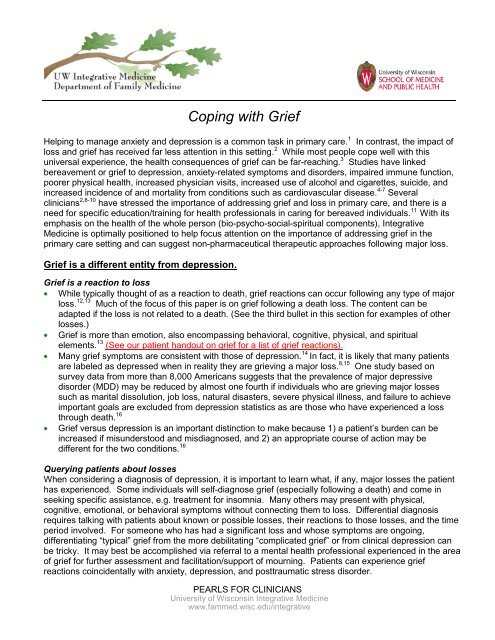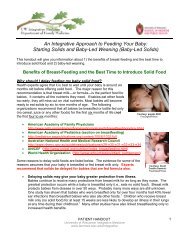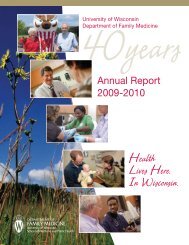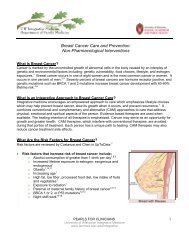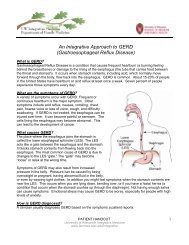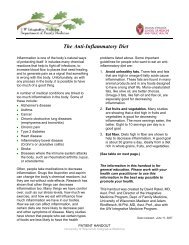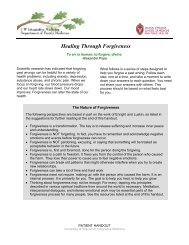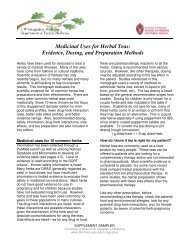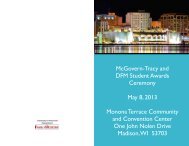Coping with Grief - UW Family Medicine - University of Wisconsin ...
Coping with Grief - UW Family Medicine - University of Wisconsin ...
Coping with Grief - UW Family Medicine - University of Wisconsin ...
Create successful ePaper yourself
Turn your PDF publications into a flip-book with our unique Google optimized e-Paper software.
Helping to manage anxiety and depression is a common task in primary care. 1 In contrast, the impact <strong>of</strong><br />
loss and grief has received far less attention in this setting. 2 While most people cope well <strong>with</strong> this<br />
universal experience, the health consequences <strong>of</strong> grief can be far-reaching. 3 Studies have linked<br />
bereavement or grief to depression, anxiety-related symptoms and disorders, impaired immune function,<br />
poorer physical health, increased physician visits, increased use <strong>of</strong> alcohol and cigarettes, suicide, and<br />
increased incidence <strong>of</strong> and mortality from conditions such as cardiovascular disease. 4-7 Several<br />
clinicians 2,8-10 have stressed the importance <strong>of</strong> addressing grief and loss in primary care, and there is a<br />
need for specific education/training for health pr<strong>of</strong>essionals in caring for bereaved individuals. 11 With its<br />
emphasis on the health <strong>of</strong> the whole person (bio-psycho-social-spiritual components), Integrative<br />
<strong>Medicine</strong> is optimally positioned to help focus attention on the importance <strong>of</strong> addressing grief in the<br />
primary care setting and can suggest non-pharmaceutical therapeutic approaches following major loss.<br />
<strong>Grief</strong> is a different entity from depression.<br />
<strong>Coping</strong> <strong>with</strong> <strong>Grief</strong><br />
<strong>Grief</strong> is a reaction to loss<br />
While typically thought <strong>of</strong> as a reaction to death, grief reactions can occur following any type <strong>of</strong> major<br />
loss. 12,13 Much <strong>of</strong> the focus <strong>of</strong> this paper is on grief following a death loss. The content can be<br />
adapted if the loss is not related to a death. (See the third bullet in this section for examples <strong>of</strong> other<br />
losses.)<br />
<strong>Grief</strong> is more than emotion, also encompassing behavioral, cognitive, physical, and spiritual<br />
elements. 13 (See our patient handout on grief for a list <strong>of</strong> grief reactions).<br />
Many grief symptoms are consistent <strong>with</strong> those <strong>of</strong> depression. 14 In fact, it is likely that many patients<br />
are labeled as depressed when in reality they are grieving a major loss. 8,15 One study based on<br />
survey data from more than 8,000 Americans suggests that the prevalence <strong>of</strong> major depressive<br />
disorder (MDD) may be reduced by almost one fourth if individuals who are grieving major losses<br />
such as marital dissolution, job loss, natural disasters, severe physical illness, and failure to achieve<br />
important goals are excluded from depression statistics as are those who have experienced a loss<br />
through death. 16<br />
<strong>Grief</strong> versus depression is an important distinction to make because 1) a patient’s burden can be<br />
increased if misunderstood and misdiagnosed, and 2) an appropriate course <strong>of</strong> action may be<br />
different for the two conditions. 16<br />
Querying patients about losses<br />
When considering a diagnosis <strong>of</strong> depression, it is important to learn what, if any, major losses the patient<br />
has experienced. Some individuals will self-diagnose grief (especially following a death) and come in<br />
seeking specific assistance, e.g. treatment for insomnia. Many others may present <strong>with</strong> physical,<br />
cognitive, emotional, or behavioral symptoms <strong>with</strong>out connecting them to loss. Differential diagnosis<br />
requires talking <strong>with</strong> patients about known or possible losses, their reactions to those losses, and the time<br />
period involved. For someone who has had a significant loss and whose symptoms are ongoing,<br />
differentiating “typical” grief from the more debilitating “complicated grief” or from clinical depression can<br />
be tricky. It may best be accomplished via referral to a mental health pr<strong>of</strong>essional experienced in the area<br />
<strong>of</strong> grief for further assessment and facilitation/support <strong>of</strong> mourning. Patients can experience grief<br />
reactions coincidentally <strong>with</strong> anxiety, depression, and posttraumatic stress disorder.<br />
PEARLS FOR CLINICIANS<br />
<strong>University</strong> <strong>of</strong> <strong>Wisconsin</strong> Integrative <strong>Medicine</strong><br />
www.fammed.wisc.edu/integrative
<strong>Coping</strong> <strong>with</strong> <strong>Grief</strong><br />
Differential Diagnosis<br />
Typical grief<br />
While universal, “typical” grief can be pr<strong>of</strong>oundly painful and disruptive and may feel anything but normal<br />
to the person who is grieving. In addition some typical grief symptoms, such as feeling short <strong>of</strong> breath<br />
and muscle weakness, may not be recognized as grief reactions and others, e.g., auditory or visual<br />
hallucinations, may appear pathological to those unfamiliar <strong>with</strong> grief symptomatology. Discussion has<br />
occurred about prescribing medication for acute, normal grief; the consensus is that it should be used<br />
sparingly to give relief from anxiety or insomnia, rather than to treat depressive symptoms. 17<br />
Complicated grief<br />
Deviations from “typical” grief that require more aggressive intervention were described as early as<br />
1944. 18 More attention has been focused on complicated grief recently. An estimate published in 2011<br />
indicates that 7% <strong>of</strong> those bereaved experience complicated grieving. 19 In complicated grieving,<br />
symptoms are long-lasting and may intensify over time, and the person has trouble accepting the death<br />
and resuming life. It is as if the person is in a chronic, heightened state <strong>of</strong> mourning. 20<br />
Complicated grief, identified as Persistent Complex Bereavement Disorder, has been added to the Fifth<br />
Edition <strong>of</strong> the Diagnostic and Statistical Manual <strong>of</strong> Mental Disorders (DSM-V) published in 2013. 21 It is<br />
in Section III, which contains conditions that are in need <strong>of</strong> further research. For diagnosis, grief<br />
symptoms must persist to a “clinically significant degree” for at least 12 months (6 months for children)<br />
following the death <strong>of</strong> someone close and be “out <strong>of</strong> proportion or inconsistent <strong>with</strong> cultural, religious, or<br />
age-appropriate norms.” A similar classification, Prolonged <strong>Grief</strong> Disorder, has been proposed for the<br />
eleventh version <strong>of</strong> the International Classification <strong>of</strong> Diseases and Related Health Problems (ICD-11)<br />
to be approved in 2015. 22<br />
A recent study <strong>of</strong> bereaved spouses found that those <strong>with</strong> poor health at the time <strong>of</strong> loss had<br />
significantly higher risks <strong>of</strong> complicated grief and major depressive disorder. 23<br />
SCREENING TOOL--BRIEF GRIEF QUESTIONNAIRE<br />
The Brief <strong>Grief</strong> Questionnaire developed by M. Katherine Shear MD and Susan Essock Ph.D. 24<br />
is an efficient tool to screen for complicated grief in primary care settings. 25<br />
A copy is appended on page 12.<br />
Major depressive disorder (MDD)<br />
Differentiation between grief and depression is complicated by a lack <strong>of</strong> established criteria.<br />
Overlapping symptoms include sleep disturbance, appetite disturbance, and intense sadness, while<br />
loss <strong>of</strong> self-esteem and general overall sense <strong>of</strong> guilt usually are associated <strong>with</strong> depression rather than<br />
grief. 17 Rando, however, cautions that lowered self-esteem is not an uncommon consequence <strong>of</strong> major<br />
loss. 14 In complicated grief, longing and sadness are salient emotions. 25 For patients <strong>with</strong> MDD,<br />
treatment such as anti-depressants may help lift the depression, so that an individual is better able to<br />
focus on tasks <strong>of</strong> mourning. 17<br />
Posttraumatic stress disorder (PTSD)<br />
An individual may have PTSD if the circumstances <strong>of</strong> the death were violent or traumatic. Reactions<br />
might include: recurrent disturbing recollections <strong>of</strong> the death, avoidance <strong>of</strong> situations associated <strong>with</strong><br />
the death, difficulty sleeping, difficulty concentrating, and angry outbursts. 26<br />
PEARLS FOR CLINICIANS 2<br />
<strong>University</strong> <strong>of</strong> <strong>Wisconsin</strong> Integrative <strong>Medicine</strong><br />
www.fammed.wisc.edu/integrative
<strong>Coping</strong> <strong>with</strong> <strong>Grief</strong><br />
RECOMMENDATIONS FROM THE LITERATURE<br />
ON SCREENING, REFERRAL, AND TREATMENT<br />
“Persistent interrupted sleep and persistent inability to concentrate lasting more than 3<br />
months after the death <strong>of</strong> a spouse should be considered warning signs and trigger<br />
referral to a physician for screening for depression.” 5 (J. Richard Williams, page 202)<br />
“We recommend treatment for MDD or complicated grief lasting 6 months post-loss or<br />
beyond. The delay in treatment minimizes the identification and treatment <strong>of</strong> falsepositive<br />
cases <strong>of</strong> MDD or complicated grief—cases that would resolve <strong>with</strong>out<br />
intervention. Obviously, immediate attention from a mental health pr<strong>of</strong>essional should be<br />
sought if suicidality is suspected at any time post-loss.” 27 (Holly G. Prigerson & Selby C.<br />
Jacobs, p. 1374)<br />
“Individuals <strong>with</strong> complicated grief have greater risk <strong>of</strong> adverse health outcomes, should<br />
be diagnosed and assessed for suicide risk and comorbid conditions such as depression<br />
and posttraumatic stress disorder, and should be considered for treatment.” 25<br />
(Naomi M. Simon, p. 416.)<br />
Cultural, gender, and individual differences in grieving<br />
Commonalities exist in grief reactions <strong>of</strong> many people, but no reactions are absolute. The grief experience<br />
varies widely and is influenced by many things such as a person’s age, gender, relationship <strong>with</strong> the<br />
deceased, culture, personality, previous experiences, coping skills, and social support.<br />
Cultural<br />
Cultural differences in grief are enormous and very important. 28 What is considered typical in one culture<br />
may be seen as pathological in another. A particular grief reaction may have totally different meaning<br />
<strong>with</strong>in different cultures. If addressing grief <strong>with</strong> patients and families from a culture other than one’s own,<br />
it is important to learn more about grief expression typical for that culture through asking directly, reading,<br />
or seeking consultants.<br />
Gender<br />
Many men (and some women) have muted emotional reactions. Their grief experience may be more<br />
behavioral or cognitive than emotional. In the past, this way <strong>of</strong> reacting to loss was considered less<br />
adaptive; more recent evidence challenges this assumption. 29 People whose grief experience is more<br />
behavioral or cognitive may benefit from grief strategies incorporating these approaches. 13 Behavioral<br />
approaches involve doing something based upon the bereaved person’s interests and abilities: for example,<br />
a bereaved individual might build or make something to memorialize the deceased, sing a special song in<br />
memory <strong>of</strong> the deceased, or plant a tree or memory garden. Cognitive approaches focus on what the<br />
bereaved individual is thinking.<br />
Individual<br />
Worden has identified other influences on grieving. See box on page 4.<br />
PEARLS FOR CLINICIANS 3<br />
<strong>University</strong> <strong>of</strong> <strong>Wisconsin</strong> Integrative <strong>Medicine</strong><br />
www.fammed.wisc.edu/integrative
<strong>Coping</strong> <strong>with</strong> <strong>Grief</strong><br />
Worden’s Mediators <strong>of</strong> Mourning 17<br />
Who died? Relationship to the bereaved<br />
Nature <strong>of</strong> the attachment? How close? Was relationship required for security and esteem? Was<br />
it dependent? Was it ambivalent? Was it conflicted? (These may cause grieving to be more<br />
difficult).<br />
How the person died? Geographically close? Anticipated or unexpected? Violent? Seen as<br />
preventable? Presumed dead or definitive? Stigmatized by some?<br />
History? Experienced other major losses in the past? If so, how were these grieved? <strong>Family</strong><br />
history regarding grief? Mental health issues?<br />
Personality? Age? Gender? <strong>Coping</strong> style? Healthy attachments <strong>with</strong> others? Usually optimistic<br />
or negative over-generalizing (e.g., “I will never get over this.”)? Level <strong>of</strong> self-esteem and selfefficacy?<br />
Beliefs and values (e.g., spiritual)?<br />
Social? Satisfaction <strong>with</strong> available support? (A relationship <strong>with</strong> a companion animal has also<br />
been found to reduce symptoms). 30 What social roles (relative, friend, employee, involvement in<br />
groups) does griever hold? (Multiple are helpful). Identifies <strong>with</strong> subcultures (e.g., religious,<br />
cultural)?<br />
Concurrent stresses? Other losses (deaths, finances, change in living arrangements)?<br />
“It pays to treat everyone as though he or she were from a different culture. The crosscultural<br />
emphasis, in fact, is a kind <strong>of</strong> metaphor. To help effectively, we must overcome our<br />
presuppositions and struggle to understand people on their own terms.” 31<br />
Anticipatory and disenfranchised grief: times for heightened sensitivity<br />
(Paul C. Rosenblatt, p. 18)<br />
Anticipatory grief<br />
Anticipatory grief occurs when a death or other loss is perceived as imminent and an individual begins<br />
grieving before the actual loss occurs. 14 Mostly, it is a healthy experience; anticipation allows preparation,<br />
development <strong>of</strong> coping strategies, and mobilization <strong>of</strong> assistance. 32 Rando has clarified that <strong>of</strong>ten<br />
anticipatory grief includes mourning over a series <strong>of</strong> shifting current losses as well as the eventual death, as<br />
an individual’s health, abilities, and plans for the future fade. 33 Anticipatory grief does not lessen the grief<br />
reactions that occur following the loss. 33 One is a reaction to the expectation <strong>of</strong> loss and steps along that<br />
pathway; the other is a reaction to the finality <strong>of</strong> the loss. Awareness <strong>of</strong> the phenomenon <strong>of</strong> anticipatory<br />
grief allows the clinician to provide on-going support according to the needs <strong>of</strong> the patient and family.<br />
“The more we can learn about anticipatory grief and mourning, the better we will be as<br />
helpers and as fellow human beings. In the long term, better understanding and appreciation<br />
are a constant goal; in the short term heightened sensitivity and genuine caring are most<br />
highly prized.” 34 (Charles A. Corr, p.17)<br />
PEARLS FOR CLINICIANS 4<br />
<strong>University</strong> <strong>of</strong> <strong>Wisconsin</strong> Integrative <strong>Medicine</strong><br />
www.fammed.wisc.edu/integrative
<strong>Coping</strong> <strong>with</strong> <strong>Grief</strong><br />
Disenfranchised grief<br />
Disenfranchised grief—hidden sorrow--is grief experienced when a loss is not or cannot be openly<br />
acknowledged, publicly mourned, or socially supported. 32 The importance <strong>of</strong> the loss rests in the viewpoint<br />
<strong>of</strong> the person experiencing the loss, not the opinion <strong>of</strong> others. Disenfranchised grief is a growing issue<br />
affecting millions <strong>of</strong> people, 35 putting them at risk for complicated grieving. Some examples include:<br />
Unrecognized relationships: ex-spouse, partner from an extra-marital affair, gay partner, former<br />
friend, co-worker<br />
Losses <strong>of</strong>ten not socially validated: infertility, abortion, perinatal death, death <strong>of</strong> a companion<br />
animal, death <strong>of</strong> a very elderly person, loss <strong>of</strong> the personality in Alzheimer’s disease, loss <strong>of</strong> ability, loss<br />
<strong>of</strong> a role or status<br />
Occasions when the griever and/or her/his social group have difficulty dealing <strong>with</strong> the<br />
circumstances <strong>of</strong> the loss: death involving stigma (e.g., following a suicide, AIDS or a criminal act),<br />
circumstances <strong>of</strong> the death too horrible to face.<br />
Occasions when the bereaved are assumed by some to be incapable <strong>of</strong> grieving or perceived as<br />
not being strong enough to handle the loss, needing to be “protected”: children, people <strong>with</strong><br />
intellectual disabilities, the elderly.<br />
Multiple losses in a short span <strong>of</strong> time, so that some have not been acknowledged.<br />
Disenfranchised grievers may not recognize that their own symptoms are related to grief. An<br />
important step is helping the person verbalize the importance and meaning <strong>of</strong> the relationship (or nondeath<br />
loss). Primary care practitioners are in a unique position <strong>of</strong> trust to recognize<br />
disenfranchised grief and start the process <strong>of</strong> validation and support for the grieving person. 2<br />
<strong>Grief</strong> theory in a nutshell: A shifting paradigm<br />
Theory and research guide clinical action. No grief theory is applicable to all cultures; the following synopsis<br />
is relevant to many in our western culture. Most clinicians and many patients are familiar at least nominally<br />
<strong>with</strong> Elizabeth Kubler- Ross’ stage theory <strong>of</strong> the process <strong>of</strong> dying: denial, anger, bargaining, depression, and<br />
acceptance, 36 which was <strong>of</strong>ten applied to grieving individuals as well as the dying. While acknowledging her<br />
important pioneering work, some contemporary theorists note the lack <strong>of</strong> empirical evidence for her model,<br />
the lack <strong>of</strong> recognition <strong>of</strong> individual and cultural differences, and the inaccurate assumptions that individuals<br />
pass neatly through stages. These theorists view grief as a process or series <strong>of</strong> tasks towards integrating<br />
the loss into one’s life and the griever as an active rather than passive participant. Worden describes four<br />
tasks <strong>of</strong> mourning and stresses that the process is fluid. 17 An individual can work on multiple tasks<br />
simultaneously, and tasks can be revisited and reworked over time. He uses psychiatrist George Engel’s<br />
analogy <strong>of</strong> healing to describe that a person can accomplish some <strong>of</strong> these tasks and not others, thus not<br />
fully adapting to a loss, as a person might not completely heal or recover function following a wound. 17<br />
TASKS OF MOURNING<br />
Task I: To accept the reality <strong>of</strong> the loss.<br />
Task II: To process the pain <strong>of</strong> grief<br />
Task III: To adjust to a world <strong>with</strong>out the deceased.<br />
External: How has the death affected everyday life?<br />
Internal: How has the death affected feelings about self and abilities?<br />
Spiritual: How has the death affected spiritual beliefs and views <strong>of</strong> the world?<br />
Task IV: To find an enduring connection <strong>with</strong> the deceased in the midst <strong>of</strong> embarking on a new life.<br />
PEARLS FOR CLINICIANS 5<br />
<strong>University</strong> <strong>of</strong> <strong>Wisconsin</strong> Integrative <strong>Medicine</strong><br />
www.fammed.wisc.edu/integrative
<strong>Coping</strong> <strong>with</strong> <strong>Grief</strong><br />
How to help<br />
Recent grief specialists teach us that the goal for the bereaved is not to “recover” from the<br />
loss, but rather to focus on the change and learn how to integrate the loss into one’s life. 13<br />
The PLISSIT model<br />
The PLISSIT model can be a guide for primary health care practitioners in assisting their patients towards<br />
this goal. PLISSIT is an acronym for Permission, Limited Information, Specific Suggestions, and Intensive<br />
Therapy, a model developed by Annon to address sexuality issues. 37 Because <strong>of</strong> its utility, it can be applied<br />
in other healthcare situations as well. 38 The model includes four levels <strong>of</strong> intervention, ranging from basic to<br />
complex. It guides clinicians to support patients according to the clinicians’ own comfort level and expertise<br />
as well as the needs <strong>of</strong> patients. Referrals can be made when patients’ needs exceed clinicians’ comfort,<br />
knowledge, and time.<br />
Permission<br />
Clinicians can initiate the topic <strong>of</strong> loss, giving patients the opportunity to talk about the experience.<br />
Some patients may choose not to do so. In our fast-paced, multi-tasking society, adults may feel<br />
pressured by themselves or others to resume their former lifestyle <strong>with</strong> minimal disruption. Clinicians<br />
can <strong>of</strong>fer “permission” to grieve as needed. For many patients, this interest and support will be the only<br />
intervention needed.<br />
Limited Information<br />
Limited information will be helpful to other patients. This second level requires more knowledge about<br />
grief to answer patients’ questions and dispel misconceptions. Many people know little about grief<br />
reactions until they experience them. People frequently ask if their reactions are normal and if they are<br />
going crazy. They can be relieved to learn that their reactions and the duration <strong>of</strong> their grief are similar<br />
to the experiences <strong>of</strong> others <strong>with</strong> comparable losses. Or if different, they can be reassured that<br />
everyone grieves in her or his own unique ways. When appropriate, the clinician can educate patients<br />
about anticipatory grief or disenfranchised grief, so that grievers will understand that their reactions are<br />
valid and the relationships are important ones, as well as receive reassurance that they have strength to<br />
cope. 39 Factual information in patient handouts and a list <strong>of</strong> grief resources (e.g., support groups) may<br />
be helpful. (See our patient handout on grief).<br />
Specific Suggestions<br />
Fewer patients will require some specific suggestions. This level involves advanced knowledge and skill<br />
to understand a patient’s unique situation and develop a plan. Clinician and patient can discuss the<br />
loss experience more thoroughly, collaboratively identify issues to be addressed, problem-solve, and<br />
choose strategies based upon one or more tasks <strong>of</strong> mourning. For example, for a patient distraught<br />
over the pain <strong>of</strong> grief (Worden’s second task), a clinician could help develop a healthy plan to work<br />
through the pain. This might involve reassuring the individual that the pain will not always be so intense,<br />
identifying one or more people who are good listeners in the person’s social circle to contact when<br />
emotions seem over-whelming, minimizing alcohol and other drugs, avoiding major decisions which<br />
one might regret later, and choosing a form <strong>of</strong> physical activity that would be do-able <strong>with</strong> current<br />
energy level.<br />
Intensive Therapy<br />
A minority <strong>of</strong> patients will require intensive therapy. This final stage usually requires referral to a<br />
specialist in grief.<br />
PEARLS FOR CLINICIANS 6<br />
<strong>University</strong> <strong>of</strong> <strong>Wisconsin</strong> Integrative <strong>Medicine</strong><br />
www.fammed.wisc.edu/integrative
Helping strategies<br />
<strong>Coping</strong> <strong>with</strong> <strong>Grief</strong><br />
“…people cope <strong>with</strong> loss in different ways and therefore may have different needs for<br />
intervention and different responses to a given type <strong>of</strong> intervention.” 40 (Dale G. Larson &<br />
William T. Hoyt, p. 169 )<br />
Many strategies exist to help individuals cope <strong>with</strong> major loss. Information is available from grief<br />
specialists, pr<strong>of</strong>essional grief literature, and a plethora <strong>of</strong> books for the general public. Following are some<br />
non-pharmaceutical approaches that health care practitioners may feel comfortable doing or suggesting:<br />
Salutogenesis-Oriented Sessions (SOS)<br />
Probably the most important thing health care practitioners have to <strong>of</strong>fer grieving patients is their<br />
compassion and understanding. Validation <strong>of</strong> the person’s grief experience is important. Rakel<br />
proposes the use <strong>of</strong> salutogenesis-oriented sessions to facilitate health. 41 Such a healing session<br />
could be used to help assess whether grief is causing a patient’s symptoms as well as to assist the<br />
patient <strong>with</strong> the tasks <strong>of</strong> grief. For bereaved families following a sudden death, being able to ask<br />
questions and receiving accurate information about the cause <strong>of</strong> death can be very helpful. 42 Families<br />
may need clinicians to repeat this information several times. Another helpful intervention is inviting and<br />
allowing time for family members to share their stories about the loss. 42<br />
Addressing spirituality issues<br />
Certain losses challenge some grievers’ spiritual beliefs, causing them to question their existential<br />
views. 13 They may experience this as an internally chaotic time, feeling ungrounded or adrift. It can<br />
also become a time when grievers reaffirm or redefine their belief systems and grow in new directions.<br />
A referral to a chaplain, clergy, or other spiritual leader may be helpful.<br />
Facilitating support from family and friends<br />
People benefit from social support <strong>of</strong> their losses. Some grievers may be hesitant to seek the support<br />
they need. Others may need to tell the story <strong>of</strong> their loss over and over again as they come to terms<br />
<strong>with</strong> it. This need to retell may clash <strong>with</strong> the needs <strong>of</strong> people in their support system whose patience,<br />
time, and energy can become taxed. A clinician can encourage grievers to contact family and friends in<br />
the first situation and in the second situation can help them to identify those in their social circle who are<br />
particularly good listeners <strong>with</strong> time available or to locate a grief support group.<br />
<strong>Grief</strong> support groups<br />
<strong>Grief</strong> support groups are available in many communities and also on-line. Hospices are usually good<br />
sources for information on their availability. Some may wish to consider groups that incorporate<br />
Mindfulness Based Stress Reduction (MBSR), which is based on Eastern philosophies and uses<br />
meditation to calm the mind and body.<br />
Non-pharmaceutical approaches to prevent or treat depression<br />
For information on non-pharmaceutical approaches to prevent or treat depression, see our clinician and<br />
patient handouts on this topic.<br />
PEARLS FOR CLINICIANS 7<br />
<strong>University</strong> <strong>of</strong> <strong>Wisconsin</strong> Integrative <strong>Medicine</strong><br />
www.fammed.wisc.edu/integrative
<strong>Coping</strong> <strong>with</strong> <strong>Grief</strong><br />
Rituals<br />
A ritual is an activity that is symbolic <strong>of</strong> feelings and thoughts related to the death and may be related to<br />
one’s cultural traditions. Perhaps the most familiar rituals are those <strong>of</strong> a visitation/wake and a<br />
funeral/memorial service. Many kinds <strong>of</strong> informal rituals can be created based on the interests and<br />
needs <strong>of</strong> the bereaved. Some examples: lighting candles on special dates to remember the deceased,<br />
sewing a memory quilt (which may be created from clothes <strong>of</strong> the deceased), planting a memory<br />
garden, sharing a memory dinner to celebrate the life <strong>of</strong> the deceased.<br />
Exercise<br />
Encourage a form <strong>of</strong> physical activity that the patient enjoys or previously enjoyed. Doing the activity<br />
<strong>with</strong> others may be even more helpful.<br />
Nature<br />
Spending time in nature can be soothing and healing.<br />
Writing or journaling<br />
Writing or journaling about one’s grief experience can help facilitate the expression <strong>of</strong> feelings and help<br />
focus on the meaning <strong>of</strong> the loss to the griever. 17 If grievers have unfinished business <strong>with</strong> the<br />
deceased they might consider expressing their thoughts and feelings through writing a “letter” to them.<br />
(See our handout Using Journaling to Aid Health).<br />
Forgiving<br />
An unexpected death can leave a bereaved individual <strong>with</strong> “unfinished business” <strong>with</strong> the deceased. If<br />
the bereaved have a sense <strong>of</strong> previously being “wronged” by the deceased, they may benefit from<br />
working on forgiveness. (See our handout Healing through Forgiveness).<br />
Massage<br />
Therapeutic massage may be helpful for someone who is experiencing tension or pain from “holding<br />
grief” in the muscles.<br />
Healing touch<br />
Healing touch is a form <strong>of</strong> energy medicine. Practitioners place their hands near or gently on the body<br />
to clear, energize, and balance the energy fields; the goal is to restore balance and harmony, so the<br />
receiver is placed in an optimal position to self-heal. 43 A directory for certified healing touch<br />
practitioners can be found at http://www.healingtouchprogram.com/energy/CHTPDirectory.shtml.<br />
Referral to a grief specialist<br />
Refer anyone who wants additional pr<strong>of</strong>essional assistance and especially patients <strong>with</strong> possible<br />
complicated grief to pr<strong>of</strong>essionals <strong>with</strong> more advanced training and experience in grief. These<br />
specialists have a wide variety <strong>of</strong> credentials (e.g., bereavement counselor, clergy, psychiatrist,<br />
psychologist, social worker). Not all pr<strong>of</strong>essionals in these helping fields have focused on grief. Local<br />
hospices may be able to recommend specialists. See our patient handout on grief for other resources.<br />
Simon’s clinical review suggests the first approach to consider for complicated grief is therapy<br />
targeted especially for this condition (that helps resolve complicating issues and facilitates the<br />
natural healing process), <strong>with</strong> anti-depressants as an adjunct if needed. Significant depression<br />
and/or suicidal ideation suggest earlier treatment <strong>with</strong> anti-depressants. 25<br />
PEARLS FOR CLINICIANS 8<br />
<strong>University</strong> <strong>of</strong> <strong>Wisconsin</strong> Integrative <strong>Medicine</strong><br />
www.fammed.wisc.edu/integrative
<strong>Coping</strong> <strong>with</strong> <strong>Grief</strong><br />
On a systems level, clinicians can advocate for the development <strong>of</strong> a comprehensive bereavement<br />
program <strong>with</strong>in their medical center. New York-Presbyterian Hospital/Weill Cornell Medical Center moved<br />
from providing minimal bereavement support to implementing a full program, which included sending<br />
condolence cards, making telephone calls to screen for complicated grief, and providing individual<br />
counseling, bereavement support groups, community referrals, and an annual memorial service. 44<br />
Health care pr<strong>of</strong>essional as griever: the importance <strong>of</strong> self-care<br />
“…grief in health care pr<strong>of</strong>essionals is <strong>of</strong>ten disenfranchised, yet the effective holistic treatment <strong>of</strong><br />
individuals <strong>with</strong> disease begins <strong>with</strong> an acknowledgment that loss is a constant companion to illness,<br />
for patients, families, and health care pr<strong>of</strong>essionals alike.” 12 (Kenneth J. Doka, p. 205)<br />
Clinicians, too, can experience disenfranchised grief, not always recognizing or acknowledging the grief<br />
inherent when one works meaningfully <strong>with</strong> sick and dying individuals and their families.<br />
See Mourning on Morning Rounds. 45<br />
Vallurupalli M. N Engl J Med. 2013;369:404-5. doi: 10.1056/NEJMp1300969.<br />
There can be many types <strong>of</strong> losses:<br />
The death <strong>of</strong> a patient may feel like a personal loss because <strong>of</strong> the bonding that occurred <strong>with</strong> patient<br />
and family. 12<br />
Loss <strong>of</strong> pr<strong>of</strong>essional expectations, self-image and identity can occur when patient outcomes are less<br />
than expected or desired. 12<br />
Loss <strong>of</strong> one’s own assumptions or beliefs about life can occur especially <strong>with</strong> unexpected patient<br />
deaths or the death <strong>of</strong> a young patient. 12<br />
Losses may remind clinicians <strong>of</strong> their own mortality. 46<br />
Losses can intensify the stresses intrinsic in complex medical organizations. 12<br />
If these losses are not acknowledged and incorporated into one’s life, grief can be compounded. Vachon<br />
describes a strategy to address the losses clinicians experience:<br />
“However, through initially learning how to recognize and deal <strong>with</strong> loss and grief through a<br />
process <strong>of</strong> mentoring in a team <strong>of</strong> committed caregivers, taking the time to grow and reflect on<br />
your own mortality, acknowledging and dealing <strong>with</strong> loss and grief as it occurs, having a full<br />
life outside the work situation, engaging in self-care, and exploring meditation and spirituality,<br />
you can continue to grow and thrive in your work.” 47 (Mary L.S. Vachon, p. 327)<br />
PEARLS FOR CLINICIANS 9<br />
<strong>University</strong> <strong>of</strong> <strong>Wisconsin</strong> Integrative <strong>Medicine</strong><br />
www.fammed.wisc.edu/integrative
<strong>Coping</strong> <strong>with</strong> <strong>Grief</strong><br />
Recommended for Pr<strong>of</strong>essionals<br />
Journal article<br />
Simon NM. Treating Complicated <strong>Grief</strong>. JAMA. 2013;310(4):416-423. (Excellent clinical review.)<br />
Books<br />
Ethnic Variations in Dying, Death, and <strong>Grief</strong>: Diversity in Universality edited by Donald P. Irish,<br />
Kathleen F. Lundquist and Vivian Jenkins Nelsen. Washington, DC: Taylor & Francis. (1993)<br />
Good <strong>Grief</strong>: Healing Through the Shadow <strong>of</strong> Loss by Deborah Morris Coryell. Inner Traditions/Bear &<br />
Company. (2007)<br />
<strong>Grief</strong> Counseling and <strong>Grief</strong> Therapy: A Handbook for the Mental Health Practitioner (4th Edition) by J.<br />
William Worden. New York: Springer Publishing Company. (2009)<br />
Living <strong>with</strong> <strong>Grief</strong>: Before and After the Death edited by Kenneth J. Doka. Washington, DC: Hospice<br />
Foundation <strong>of</strong> America. (2007)<br />
Treatment <strong>of</strong> Complicated Mourning by Therese A. Rando. Champaign, IL: Research Press. (1993)<br />
References<br />
1. Rothberg B, Schneck CD. Anxiety and depression. In Rakel, RE, Rakel DP (Eds). Textbook <strong>of</strong> <strong>Family</strong> <strong>Medicine</strong>,<br />
8 th ed.. Philadelphia: Saunders Elsevier, 2011.<br />
2. Selby S. Disenfranchised grievers: The GP’s role in management. Australian <strong>Family</strong> Physician. 2007;36(9):768-<br />
770.<br />
3. Stroebe M, Schut H, Stroebe W. Health Outcomes <strong>of</strong> Bereavement. Lancet. 2007;370:1960-1973.<br />
4. Latham AE, Prigerson HG. Suicidality and bereavement: Complicated grief as psychiatric disorder presenting<br />
greatest risk for suicidality. Suicide Life Threat Behav. 2004 Winter;34(4):350-362.<br />
5. Williams JR. Effects <strong>of</strong> grief on survivor’s health. In: Doka K, editor. Living <strong>with</strong> <strong>Grief</strong>: Loss in Later Life.<br />
Washington (DC): The Hospice Foundation <strong>of</strong> America; 2002; 191-206.<br />
6. Most<strong>of</strong>sky E, Maclure M, Sherwood JB et al. Risk <strong>of</strong> acute myocardial infarction after the death <strong>of</strong> a significant<br />
person in one’s life: The determinants <strong>of</strong> myocardial infarction onset study. Circulation. 2012;125:491-496.<br />
7. Toblin RL, Riviere LA, Thomas JL et al. <strong>Grief</strong> and physical health outcomes in U.S. soldiers returning from<br />
combat. J Affect Disord. 2012;136:469-475.<br />
8. Crow HE. How to help patients understand and conquer grief: Avoiding depression in the midst <strong>of</strong> sadness.<br />
Postgraduate <strong>Medicine</strong>. 1991;89(8):117-122.<br />
9. Stack JM. <strong>Grief</strong> reactions and depression in family practice: Differential diagnosis and treatment. The Journal <strong>of</strong><br />
<strong>Family</strong> Practice. 1982;14(2):271-275.<br />
10. Steen KF. A comprehensive approach to bereavement. The Nurse Practitioner. 1998;23(3):54-68.<br />
11. Center for the Advancement <strong>of</strong> Health. Health care pr<strong>of</strong>essionals and health systems issues. Death Studies.<br />
2004; 28(6):543-559. Special issue: Report on Bereavement and <strong>Grief</strong> Research by the Center for the<br />
Advancement <strong>of</strong> Health.<br />
12. Doka KJ. <strong>Grief</strong>: The constant companion <strong>of</strong> illness. Anesthesiology Clin N Am. 2006; 24:205-212.<br />
13. Doka KJ. Challenging the paradigm: New understandings <strong>of</strong> grief. In: Doka K, editor. Living <strong>with</strong> grief: Before<br />
and after the death. Washington (DC): Hospice Foundation <strong>of</strong> America; 2007;87-102.<br />
14. Rando TA. Treatment <strong>of</strong> Complicated Mourning. Champaign, IL: Research Press;, 1993.<br />
15. Peota C. Sick or sad? Minn Med. 2006;89(10):<br />
15-16.<br />
16. Wakefield JC, Schmitz MF, First MB, Horwitz AV. Extending the bereavement exclusion for major depression to<br />
other losses: Evidence from the National Comorbidity Survey. Arch Gen Psychiatry. 2007;64:433-440.<br />
17. Worden, JW. <strong>Grief</strong> Counseling and <strong>Grief</strong> Therapy: A Handbook for the Mental Health Practitioner (4th Edition).<br />
New York: Springer Publishing Company, 2009.<br />
18. Lindemann E. Symptomatology and management <strong>of</strong> acute grief. Am J Psychiatry. 1944;101:141-148.<br />
19. Kersting A, Brahler E, Glaesmer H, Wagner B. Prevalence <strong>of</strong> complicated grief in a representative populationbased<br />
sample. J Affect Disord. 2011;131:339-343.<br />
20. Mayo Clinic Staff. Complicated grief. Accessed at http://mayoclinic.com/health/complicatedgrief/<br />
DS01023/DSECTION=coping%2Dand%2Dsupport on 8/5/2008.<br />
PEARLS FOR CLINICIANS 10<br />
<strong>University</strong> <strong>of</strong> <strong>Wisconsin</strong> Integrative <strong>Medicine</strong><br />
www.fammed.wisc.edu/integrative
<strong>Coping</strong> <strong>with</strong> <strong>Grief</strong><br />
21. American Psychiatric Association. Diagnostic and Statistical Manual <strong>of</strong> Mental Disorders, 5 th ed. Washington<br />
DC:American Psychiatric Publishing;2013.<br />
22. Maercker A, Brewin CR, Bryant RA, et al. Diagnosis and classification <strong>of</strong> disorders specifically associated <strong>with</strong><br />
stress: Proposals for ICD-11. World Psychiatry. 2013;12:198-206.<br />
23. Utz RL, Casserta M, Lund D. <strong>Grief</strong>, depressive symptoms, and physical health among recently bereaved<br />
spouses. The Gerontologist. 2011;52(4):460-471.<br />
24. Shear KM, Jackson CT, Essock SM et al. Screening for complicated grief among Project Liberty service<br />
recipients 18 months after September 11, 2001. Psychiatr Serv. 2006;57(9):1291-1297.<br />
25. Simon NM. Treating complicated grief. JAMA. 2013;310(4):416-423.<br />
26. Ringold S. <strong>Grief</strong>. JAMA Patient Page. 2005; 293(21) accessed at www.jama.com on 12/10/07.<br />
27. Prigerson HG, Jacobs SC. Caring for bereaved patients: ”All the doctors just suddenly go.” JAMA:2001;<br />
286:1369-1376.<br />
28. Rosenblatt PC. <strong>Grief</strong>: What we have learned from cross-cultural studies. In Doka KJ (Ed.) Living <strong>with</strong> <strong>Grief</strong>:<br />
Before and after the Death. Washington, DC: Hospice Foundation <strong>of</strong> America; 2007;123-136.<br />
29. Martin T, Doka KJ. Men don’t cry, women do: Transcending gender stereotypes <strong>of</strong> grief. Philadelphia:<br />
Brunner/Mazel, 2000.<br />
30. Akiyama H, Holtzman JM, Britz WE. Pet ownership and health status during bereavement. Omega. 1986-<br />
1987;17:187-193.<br />
31. Rosenblatt PC. Cross-cultural variation in the experience, expression, and understanding <strong>of</strong> grief. In Irish DP,<br />
Lundquist KF, Nelsen VJ (Eds.) Ethnic Variations in Dying, Death, and <strong>Grief</strong>: Diversity in Universality.<br />
Washington, DC: Taylor & Francis, 1993;13-20.<br />
32. Doka K (Ed.). Disenfranchised grief: Recognizing Hidden Sorrow. Lexington, MA: Lexington, 1989.<br />
33. Rando TA. Clinical dimensions <strong>of</strong> anticipatory mourning: theory and practice in working <strong>with</strong> the dying, their loved<br />
ones and their caregivers. Champaign, IL: Research press, 2000.<br />
34. Corr CA. Anticipatory grief and mourning: An overview. In Doka KJ (Ed.) Living <strong>with</strong> <strong>Grief</strong>: Before and after the<br />
Death. Washington, DC: Hospice Foundation <strong>of</strong> America, 2007;5-20.<br />
35. Doka KJ. Introduction. In Doka KJ (Ed.). Disenfranchised grief: new directions, challenges and strategies for<br />
practice. 1 st ed. Champaign, IL: Research Press, 2002.<br />
36. Kubler-Ross E. On Death and Dying. New York: Macmillan, 1969.<br />
37. Annon JS. Behavioral Treatment <strong>of</strong> Sexual Problems: Brief Therapy. Oxford, England: Harper<br />
& Row, 1976.<br />
38. Tiedje, LB, Darling-Fisher C. Promoting father-friendly healthcare. Am J Matern Child Nurs. 2003;28(6):350-<br />
357.<br />
39. Cable DG, Martin TL. Countering empathic failure: Supporting disenfranchised grievers. In Doka KJ (Ed.) Living<br />
<strong>with</strong> <strong>Grief</strong>: Before and after the Death. Washington, DC: Hospice Foundation <strong>of</strong> America; 2007;289-298.<br />
40. Larson DG, Hoyt WT. The bright side <strong>of</strong> grief counseling: Deconstructing the new pessimism. In Doka KJ (Ed.)<br />
Living <strong>with</strong> <strong>Grief</strong>: Before and after the Death. Washington, DC: Hospice Foundation <strong>of</strong> America; 2007;157-174.<br />
41. Rakel D. The salutogenesis-oriented session: Creating space and time for healing in primary care. Explore.<br />
2008;4(1):42-47.<br />
42. Mayer D”D”M, Rosenfeld AG, Gilbert K. Lives forever changed: <strong>Family</strong> bereavement experiences after sudden<br />
cardiac death. Appl Nurs Res. 2013. http://dx.doi.org/10.1016/j.apnr.2013.06.007.<br />
43. Anonymous. Introduction to healing touch. Accessed at www.healingtouchprogram.com on 8/20/08<br />
44. Hottensen D. Bereavement: Caring for families and friends after a patient dies. Omega. 2013;67:121-126.<br />
45. Vallurupalli M. Mourning on morning rounds. N Engl J Med. 2013;369:404-405. doi: 10.1056/NEJMp1300969.<br />
46. Papadatou D. A proposed model <strong>of</strong> health pr<strong>of</strong>essionals grieving process. Omega. 2000;41:59-77.<br />
47. Vachon MLS. Caring for the pr<strong>of</strong>essional caregivers: Before and after the death. In: Doka K, editor. Living <strong>with</strong><br />
grief: before and after the death. Washington (DC): Hospice Foundation <strong>of</strong> America; 2007;311-330.<br />
This handout was created by Charlene Luchterhand, MSSW, Education/Research Coordinator,<br />
Integrative <strong>Medicine</strong> Program, Department <strong>of</strong> <strong>Family</strong> <strong>Medicine</strong>, <strong>University</strong> <strong>of</strong> <strong>Wisconsin</strong>-Madison.<br />
Date created: August 2008; revised October 2013<br />
PEARLS FOR CLINICIANS 11<br />
<strong>University</strong> <strong>of</strong> <strong>Wisconsin</strong> Integrative <strong>Medicine</strong><br />
www.fammed.wisc.edu/integrative
<strong>Coping</strong> <strong>with</strong> <strong>Grief</strong><br />
To help screen for complicated grief<br />
Ask the five questions in the Brief <strong>Grief</strong> Questionnaire during a patient’s appointment.<br />
Use <strong>with</strong> adults bereaved at least 12 months and children at least 6 months.<br />
Screen all bereaved individuals who seek treatment for suicide risk, mood, and anxiety disorders as<br />
well. These conditions may require treatment earlier than 6-12 months post bereavement.<br />
Brief <strong>Grief</strong> Questionnaire*<br />
1. How much are you having trouble accepting the death <strong>of</strong> ______________?<br />
Not at all............... 0 Somewhat..............1 A lot...................... 2<br />
2. How much does your grief still interfere <strong>with</strong> your life?<br />
Not at all............... 0 Somewhat..............1 A lot...................... 2<br />
3. How much are you having images or thoughts <strong>of</strong> _____________ when s/he died or other<br />
thoughts about the death that really bother you?<br />
Not at all............... 0 Somewhat..............1 A lot...................... 2<br />
4. Are there things you used to do when ______ was alive that you don’t feel comfortable doing<br />
anymore, that you avoid? Like going somewhere you went <strong>with</strong> him/her, or doing things you<br />
used to enjoy together? Or avoiding looking at pictures or talking about _________? How<br />
much are you avoiding these things?<br />
Not at all............... 0 Somewhat..............1 A lot...................... 2<br />
5. How much are you feeling cut <strong>of</strong>f or distant from other people since _________<br />
died, even people you used to be close to like family or friends?<br />
Not at all............... 0 Somewhat..............1 A lot...................... 2<br />
A score <strong>of</strong> 5 or more suggests an individual may have complicated grief. 24<br />
Refer the individual to a grief specialist for further evaluation.<br />
* Developed by M. Katherine Shear MD and Susan Essock Ph.D. Included <strong>with</strong> permission.<br />
PEARLS FOR CLINICIANS 12<br />
<strong>University</strong> <strong>of</strong> <strong>Wisconsin</strong> Integrative <strong>Medicine</strong><br />
www.fammed.wisc.edu/integrative


